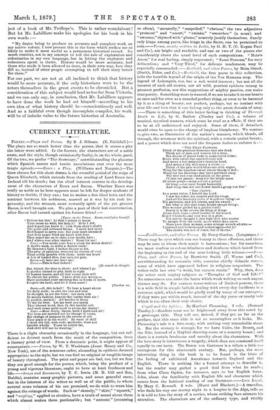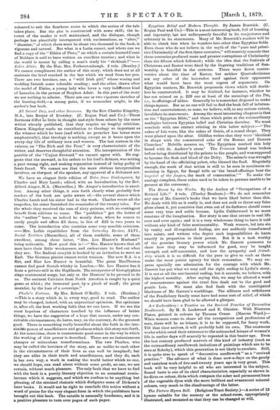Cupid and the Sphinx. By Harford Flemming. 3 vols. (Samuel
Tinsley.)—Readers must not be frightened away from this novel by a grotesque title. They will see, indeed, if they get as far as the preface, that this same title is not so meaningless as it looks. Mr. Flemming's tale is a love-story, with nothing very remarkable about it. But the scenery is strange, for we have Cairo, the Deserts and the Nile, instead of a Mayfair drawing-room or a country house ; and there is a certain freshness and novelty about the characters. With the love-story is interwoven a tragedy, which does not commend itself equally to our taste. The Baron von Gaetzner is a villain a little too outrageous for this nineteenth century. But, perhaps, the most interesting thing in the book is to be found in the hints of the feeling of cultivated Americans towards England and the English. There is nothing like a formal attempt to describe it, but the reader may gather a good deal from what he reads ; from what Clara Ogden, for instance, says to her English lover, John, about the familiarity with English life and character which comes from the habitual reading of our literature.—Love Loyal. By Mary C. Rowsell. 3 vols. (Hurst and Blackett.)—A traveller, who finds his way one stormy night to a hospice in the Alps, tells as it is told to him the story of a novice, whose striking face attracts his attention. The characters are of the ordinary type, and vividly
coloured to suit the Southern scene in which the action of the tale takes place. But the plot is constructed with some skill; the in- terest of the reader is well maintained, and the dialogue, though perhaps too plentifully interspersed with exclamations, as " altro," " diamine," of which there must be about two thousand in the book, is vigorous and natural. But what is a Latin sonnet, and where can we
find a copy of the "Ethics of Plato," on which a certain learned Count of Maldura is said to have written an excellent treatise; and what in the world is meant by calling a man's study his " skekinah P"— Robin Adair. By the Hon. Mrs. Fetherstonhaugh. 2 vols. (Bentley.) We cannot compliment the author of this story, which does not at all maintain the level reached in the last which we read from her pen. There are two heroines, one, a "wild Irish girl," whose wooing and wedding furnish some tolerable reading ; and the other, drawn after the model of Elaine, a young lady who loves a very indifferent kind of Lancelot, in the person of Stephen Adair. In this part of the story we see nothing to admire. There are one or two vigorous sketches of the hunting-field,—a strong point, if we remember aright, in the author's last book.



































 Previous page
Previous page